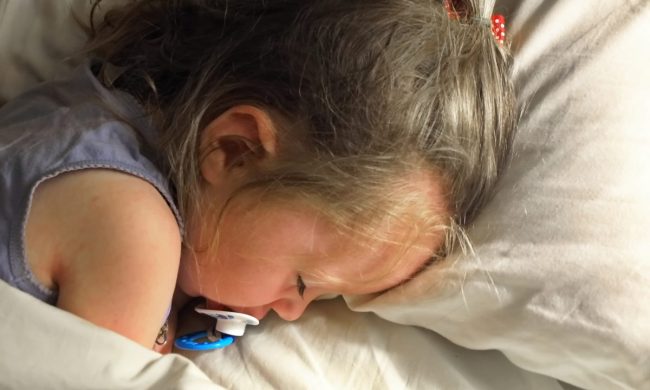According to a 2016 study, 9.4% of children in the United States have been diagnosed with attention deficit hyperactivity disorder (ADHD). Just under 2.5% of those children are toddlers between the ages of 2 and 5. The study claims that although most children aren’t diagnosed with ADHD until they begin school, there are some symptoms that begin to show during the toddler years.
Recognizing potential signs of ADHD in your toddler can help lead to an early diagnosis, which can mean getting your child any necessary help sooner. Here are six warning signs and key symptoms of ADHD in toddlers. If you’re concerned about your child’s health and behavior, you should always contact your doctor for professional guidance.

Early signs of ADHD in toddlers
According to the National Institute of Mental Health, ADHD “is marked by an ongoing pattern of inattention and/or hyperactivity-impulsivity that interferes with functioning or development.” Inattention, hyperactivity, and impulsivity are the three main symptoms of ADHD, which is why it can often be difficult to diagnose young children. Toddlers are hyperactive and impulsive by nature, so historically, it has proven difficult to diagnose ADHD in younger children. If you think your toddler may be exhibiting symptoms of ADHD, a healthcare professional will need to make that diagnosis. Your pediatrician may refer you to a mental health care professional for further observation and according to Healthline, they will require your toddler’s symptoms to continue for more than six months and affect their ability to participate in age-appropriate activities.
The most common symptom of ADHD in children between the ages of 4 and 5 is hyperactivity and impulsivity, as parents and teachers often tend to notice inattentiveness more as children begin school. Unfortunately, the symptoms can often be construed as just behavioral issues or emotional problems and many children are left undiagnosed. Some of the signs of hyperactivity and impulsivity as noted by the National Institute of Mental Health that parents can look for as early signs of ADHD in toddlers are:
- fidgeting and squirming while seated
- leaving their seats in situations when staying seated is expected, such as in the classroom or the office
- being unable to play or engage in hobbies quietly
- being constantly in motion or on the go, or acting as if driven by a motor
- talking excessively
- answering questions before they are fully asked, finishing other people’s sentences, or speaking without waiting for a turn in a conversation
- having difficulty waiting for one’s turn
- interrupting others; for example in conversations, games, or activities
At what age can a toddler be diagnosed with ADHD?
Although children are typically not evaluated for ADHD until they are school age, WebMD notes that children as young as the age of 4 can now be diagnosed, thanks to new guidelines set forth by the American Academy of Pediatrics (AAP).
How do ADHD toddlers act?
James Perrin, MD, a pediatrics professor at Harvard Medical School explained to WebMD how a toddler with ADHD’s behavior might differ from a toddler who doesn’t have ADHD. “Young kids with ADHD are incredibly active all the time,” he explained. “Most 4-year-olds are very active in general, but they settle down: take naps, sit for meals. A child with ADHD is on the go all the time.” George DuPaul, Ph.D., professor of school psychology at Lehigh University added that “what sets these kids apart is the degree and frequency with which they are hyper and impulsive. These kids are literally plowing through activities and people at a high pace.”

Signs and symptoms of ADHD in toddlers
As per the CDC, there are 18 core behaviors that are symptoms of inattentiveness and hyperactivity/impulsiveness that parents can identify to help determine if they think their child may have ADHD. These behaviors, like the ones listed above and more like trouble paying attention, trouble listening when being spoken to, or being easily distracted or forgetful are all signs and symptoms of ADHD. To obtain a diagnosis of ADHD, at least six of these behaviors need to be present for more than six months at a level that is disruptive or inappropriate for the child’s level of development.
What causes ADHD in toddlers?
The AAP notes that ADHD, a neurobiological condition, is one of the most common and studied childhood conditions. Although medical professionals and researchers are discovering more about ADHD every day, there is research that indicates some of the potential causes. Genetics can play a big role in whether or not a toddler will have ADHD and often more than one member of a family will be diagnosed. A child with ADHD has a 1 in 4 chance of having a parent with ADHD. Head injuries and prematurity can also cause ADHD as can prenatal exposure to alcohol or nicotine. Studies have also shown there is no proven correlation between eating too much sugar, food additives, allergies or immunizations, and ADHD.
If you’re concerned your toddler may have ADHD it’s important to discuss those concerns with your healthcare professional as you will need a full and complete evaluation by a medical professional to receive a diagnosis.



